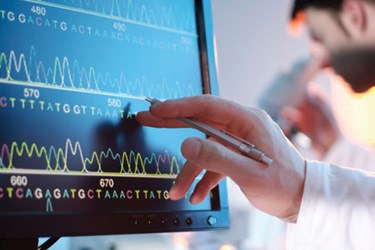NIH Issues Final Genomic Data Sharing Policy
By Nick Otto

A new final policy from The National Institutes of Health (NIH) will give scientists of government-funded research six months to load any collected genomic data into a government-stablished database.
Released Wednesday, the final genomic data sharing (GDS) policy replaces the current genome-wide association study (GWAS) data sharing policy, which was implemented back in 2007.
The policy will apply to all researchers with NIH-funded grants — starting with funding applications submitted for a January 25, 2015, receipt date — who are conducting large-scale human and non-human projects that generate genomic data, the NIH says.
Obtaining a patient’s informed consent will be a key principle of the new policy, and the collected data will be used for the “potential future use of their de-identified data for research and for broad sharing,” according to an NIH release.
“The GDS policy outlines the responsibilities of investigators and institutions that are using the data and also encourages researchers to get consent from participants for future unspecified use of their genomic data,” says Kathy Hudson, NIH deputy director for science, outreach and policy, in a written statement. She adds that the collective knowledge gained from shared data will benefit both researchers and patients but “must be done carefully.”
The NIH says researchers submitting data must certify that the collected information is legal and has ethically been obtained. Researchers should submit an institutional certification to the funding NIH institution centers and assure that:
- Submitted data is consistent with current laws and regulations and institutional policies,
- Details on any limitations of data usage in future research, due to informed consent, are expressed,
- The research-participant identities remain anonymous to NIH-designated data repositories, and
- An institutional review board or its equivalent has reviewed a sponsor’s proposal for data submission.
A two-tiered access system, which was part of the previous GWAS data policy, will continue under the new GDS guidelines to help ensure that such data is used in a controlled manner.
Data contained in unrestricted-access, NIH-designated repositories will be publicly available. Data in controlled-access repositories will only be available to researchers after NIH investigators have obtained approval from the NIH that the data will be used for secondary research.
Requirements of the data-sharing plan haven’t received such the warmest of welcomes from researchers, an article in The Chronicle of Higher Education notes. “When it appeared last year, the initial version of the NIH’s policy proposal drew criticism from the Federation of American Societies for Experimental Biology … and the Association of American Medical Colleges,” it stated.
